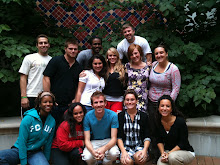Here, we are: Team Nicaragua 2010!
Front row, left to right: Amina, Jessie, Bryan, Quinn, Danae (missing: Marc)
Who we are:
Jhon Velasco, the Director of the Center for Non-Violence and Peace Initiatives and professor in the Health and Nutrition Sciences department and Kevin McGowan, the Program Assistant for the Center for Non-Violence and Peace Initiatives have been working diligently with the MSU administration/faculty and community for four years to create a team of outstanding Montclair State University students to partake in this unique project in Nicaragua.
Jhon Velasco, the Director of the Center for Non-Violence and Peace Initiatives and professor in the Health and Nutrition Sciences department and Kevin McGowan, the Program Assistant for the Center for Non-Violence and Peace Initiatives have been working diligently with the MSU administration/faculty and community for four years to create a team of outstanding Montclair State University students to partake in this unique project in Nicaragua.
The delegation is in partnership with Witness for Peace, a politically independent, nationwide grassroots organization based in Washington D.C. committed to non-violence and social justice. The focus of this year’s delegation is to learn about the educational and public health systems in Nicaragua and to use that knowledge, at home and abroad, to help create dynamic change. In addition, we will be studying and understanding issues of racism as it pertains to indigenous people of Nicaragua.
This year Team Nicaragua will consists of 14 college students on an intense 12-day educational delegation from January 4th – 16th, 2010.
Facts About Nicaragua:
Nicaragua is the poorest country in Central America
53% of homes do not have electricity
36% of homes do not have safe drinking water
79% of Nicaraguans live on less than $2 a day
Education:
34% of Nicaraguans are illiterate, in rural areas illiteracy rises to 46%
The national average for years of schooling is only 3.5 years
Only 12 of every 100 Nicaraguan youths attend university
Health care:
Nicaragua has the highest adolescent pregnancy rate in Central America
One of three children is malnourished
More than two thirds of Nicaraguan children under four have iron deficiencies
More than half the deaths of children under the age of four are caused by preventable diseases (diarrhea, pnuemonia, malnutrition etc)
The staff at Witness for Peace have organized an experience-intensive program specifically for Montclair State University to better understand the disparities of economics, politics, education and health in Nicaragua. The overall goal of this project is education for action. Upon returning, we are committed to educate and create change within our communities. This project is designed to build upon the classroom experience by applying knowledge to a challenging real world environment, as we will be staying in homes of Nicaraguan families and local hostels, sharing the day to day realities of their lives. The experiences will include meeting with a variety of organizations to learn specifically about issues of public health and education as they relate to worker’s rights, patient’s rights, and the welfare and progress of the children of Nicaragua. We will have the opportunity to learn first-hand about the lack of resources available for public schools. We will also visit hospitals/clinics and speak to doctors, nurses and public health officials to gain a better understanding of health disparities and barriers to substantial health. Unique to this year’s delegation, we will be going to the Caribbean coast to understand and study the issues of racism in Nicaragua.
In an effort to understand more about public health and education disparities, our delegation will learn about Nicaragua’s economic struggles with a unique opportunity to tour a “maquilardora,” which is a foreign-owned factory, to learn about unsafe working conditions and help take action to promote healthier and safer working environments.
In an effort to understand more about public health and education disparities, our delegation will learn about Nicaragua’s economic struggles with a unique opportunity to tour a “maquilardora,” which is a foreign-owned factory, to learn about unsafe working conditions and help take action to promote healthier and safer working environments.
Most importantly, we will return from the experience with an increased awareness of global relationships and the tools and skills needed to educate our community and influence U.S. policy makers and consumers to support policies and practices that can create positive systemic change in developingcountries.
In addition, picking up from the successful awareness campaign following the 2010 Team Nicaragua delegation, Professor Velasco and Kevin McGowan will be designing a classroom tour for the Spring semester that will include implementing workshops and lectures about Nicaraguan social disparities, including public health education, awareness, and promotion. Faculty and Administration from many departments on campus, including Health Promotion and Health Counseling, have been enthusiastic supporters of our efforts and are willing to continue inviting us to present to their classes.
To learn more about Team Nicaragua 2010 and prior delegations, please visit the following websites:



No comments:
Post a Comment